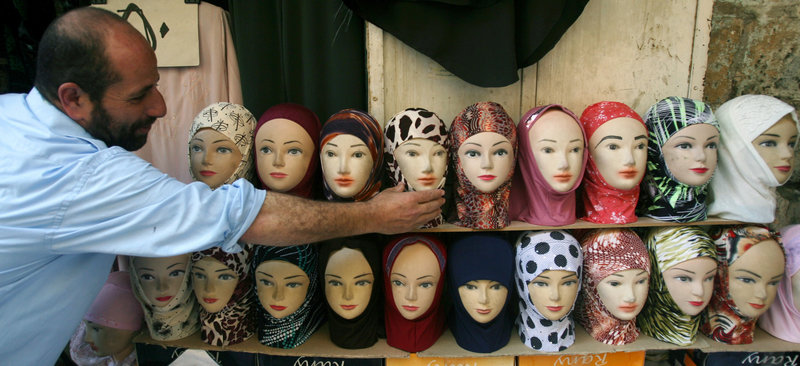TERRE HAUTE, Ind. – During a presentation, Lobna “Luby” Ismail, an American-born Muslim of Egyptian descent, asked audience members at Rose-Hulman Institute of Technology to close their eyes.
When they opened their eyes, she had put on a hijab, or traditional black head scarf worn by many Muslim women when in public.
She asked audience members about stereotypes often associated with Muslim women. They responded: Muslim women are controlled by men in their lives, they have no personality, and they are unapproachable. They are foreigners, anti-American and terrorists.
“I am none of these,” Ismail said. She is a businesswoman and a native English-speaker born in West Lafayette. She is a soccer mom, a former Miss Softball America player, a woman with multiple sclerosis, an American and a Muslim.
While dressed modestly in a pantsuit, she did not wear a scarf, or hijab, at Rose-Hulman, although she will wear it in a more conservative Muslim environment or country, she said.
She told the future engineers that their cultural competence and awareness will be critical as they deal with customers in a global economy. “The barrier of bias is the greatest barrier to how we engage with one another,” she said.
Ismail, a Muslim culture expert, talked to an audience of about 60 at Hulman Union Thursday.
She is founder and president of Connecting Cultures Inc. in Washington, D.C., and has more than 20 years of experience in the areas of cross-cultural communication, Arab and American cultures, Islamic awareness and religious diversity.
She works with the U.S. Department of Justice to train law enforcement officers, educators and community leaders.
In an interview, she said she hoped to convey that Muslims, and Islam, are not necessarily from somewhere far away.
In her own case, she has Hoosier roots. “I am a Hoosier, and I’m so glad to be back here in Indiana,” she told the audience. Her parents came from Egypt in 1961 to pursue doctoral degrees at Purdue. They later moved to Florida.
In her talk, she hoped to deal with “the conscious or unconscious bias or stereotypes about Muslims,” she said.
She talked about the six main beliefs of Muslims all over the world, the foundation of the religion and how much it is connected to Christianity and Judaism.
She also explained the five practices or pillars of the religion, which include praying five times a day and giving 2.5 percent of one’s wealth to the poor.
Muslims believe in one God, Allah, and they believe in a final day of judgment — when Allah will weigh each individual’s good and bad deeds and determine a person’s final destination in the afterlife.
She also pointed out that only one out of five Muslims is Arab, and that many Muslims reside in Southeast Asia and the continent of Africa.
Ismail said she grew up with evangelical Christians. “They were my best friends,” she said.
Islam is based on peace, she said, “and it is particularly painful for us as Muslims to see our religion so tied to war, violence and terrorism, which is so contrary to our lives, our beliefs and our faith.”
Twelve years after the 9/11 terrorist attacks, prejudice toward Muslims still exists in America, she said.
Last week in New York, a woman who covered her hair was yelled at, harassed and called an “expletive” terrorist. A Sikh professor at Columbia University was brutally beaten.
While acceptance of Muslims in post-9/11 America has improved, “more needs to be done,” she said. “We can do better.”
What exists now, that didn’t exist back then, she said, is an organized, funded effort to demonize, ostracize and create a phobia against Muslims, which she called “Islamophobia.”
She also noted that when Muslims want to build mosques, which is their constitutional right, there is frequently opposition, such as in Murfreesboro, Tenn.
The U.S. Justice Department got involved in that case and determined that opponents “cannot stop the building of a house of worship,” she said.
“I feel the best of America and the beauty of our nation is that we have a Constitution that protects our individual civil rights and civil liberties, and that’s what I love about America,” she said.
Her presentation was part of Rose-Hulman’s initiative to get students, faculty and staff more familiar with global cultural diversity.
Send questions/comments to the editors.



Success. Please wait for the page to reload. If the page does not reload within 5 seconds, please refresh the page.
Enter your email and password to access comments.
Hi, to comment on stories you must . This profile is in addition to your subscription and website login.
Already have a commenting profile? .
Invalid username/password.
Please check your email to confirm and complete your registration.
Only subscribers are eligible to post comments. Please subscribe or login first for digital access. Here’s why.
Use the form below to reset your password. When you've submitted your account email, we will send an email with a reset code.